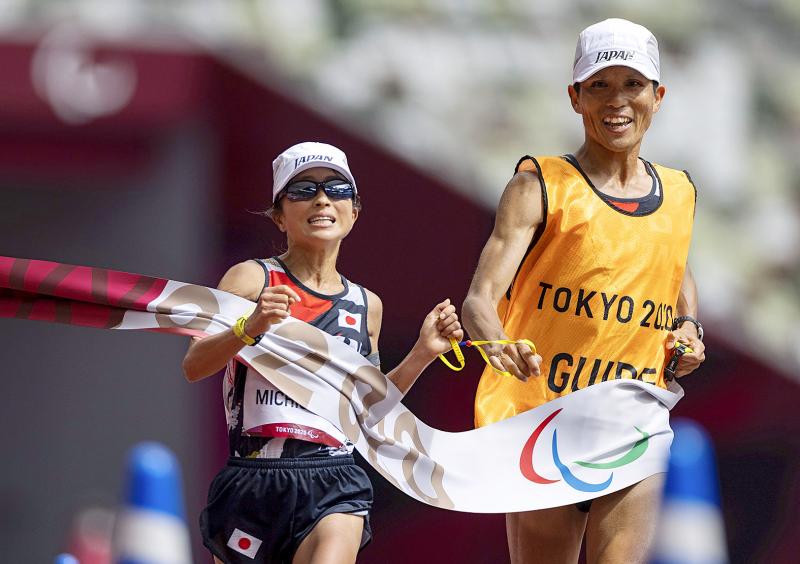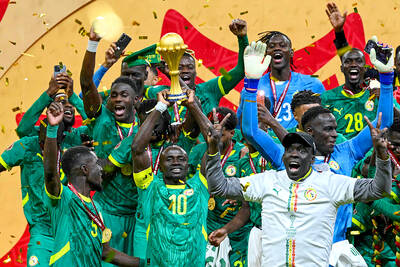When Misato Michishita won the Paralympic marathon in Tokyo this summer, she picked up more than a gold medal. The visually impaired Japanese office worker became a must-get for organizers of today’s Boston Marathon, where she is to headline one of three new para divisions being unveiled for the 125th edition of the race.
“I had a dream about running a Boston Marathon for a long time,” Michishita said. “Most runners have the goal to run the Boston Marathon, so I would like to be a part of that.”
The first major marathon to include a wheelchair race, in 1975, Boston has named a champion in a visually impaired division since 1986.

Photo: AP
Ever since the 2013 finish-line bombing that killed three people and left so many with prosthetic limbs, organizers sought a way to be more inclusive for para athletes who had long participated only for the satisfaction of finishing.
For the first time this year, the Boston Athletic Association (BAA) is to award titles and prize money in three new divisions: visually impaired, upper-body impairment and lower-body impairment. The top men and women in each would receive US$1,500 from a total purse of US$16,500.
“It doesn’t surprise me that it was Boston first to do that,” said Manuela Shar, a two-time defending Boston wheelchair winner who also took gold at the Tokyo Paralympics. “It’s good to see things moving in the direction of inclusion and equality.”
Blind in her right eye since middle school due to a rare genetic disease in her cornea, Michishita began running marathons at 26.
Using a guide to direct her along the course, she won a silver medal in Rio de Janeiro and saw the opportunity to upgrade to gold in her homeland.
When the 2020 Olympics and Paralympics were delayed for a year, Michishita remained confident that they would not be canceled.
Now 44, she struggled to train because of a COVID-19 state of emergency in Japan that prevented her from getting together with her guide.
She broke the tape in Tokyo in 3 hours, 50 seconds — a Paralympic record that increased her profile and sealed the deal with Boston organizers.
“We had to have her,” BAA chief operating officer Jack Fleming said.
Joe Walsh, who is the former head of the US Olympic and Paralympic Committee’s Paralympic division and is advising the BAA, said organizers hope the new categories will provide the sort of motivation for impaired runners that the push-rim competition has given wheelchair racers.
Five-time winner wheelchair winner Tatyana McFadden “is a role model and inspiration to others who are wheelchair users who may want to be active and participate in sports, maybe even do something like the Boston Marathon,” said Walsh, a two-time Paralympian as a cross-country skier.
“In the same way that has grown over the last 50 years, the vision here is that the same thing will happen with the divisions that focus on the visually impaired and mobility impaired runners,” he said.
There are 35 runners entered in the visually impaired division for today’s race and 238 total in the para athlete divisions.
Many others would be running recreationally because they have not gone through the international or US classification process, or could not meet the more stringent qualifying time of 3 hours, 40 minutes for men aged 18 to 39.
Walsh said the benefits of the new divisions might not be obvious right away.
“Maybe it doesn’t blow up the number of athletes with vision impairments running the Boston Marathon, but maybe it boosts the number who run 5Ks and 10Ks, and who are active in other sports, triathlon or swimming or whatever,” he said. “It has a broader perspective than just running, it crosses over into other fields of accomplishment as well, especially those that are related to sport.”

Manchester United on Tuesday confirmed Michael Carrick as interim manager until the end of the season, tasking him with leading the Red Devils back into the UEFA Champions League. “Having the responsibility to lead Manchester United is an honor,” said Carrick, 44, who won 12 major trophies in his 12-year playing career at United. The former midfielder previously had an unbeaten three-game stint as caretaker boss at Old Trafford in 2021. Carrick then took on his first permanent managerial role at second-tier Middlesbrough in October 2022 and was sacked in June last year after the club finished 10th in the

MARRED FINAL: As most of Senegalese players walked off the pitch after a controversial decision, some supporters threw objects and attempted to get onto the pitch Senegal on Sunday won the Africa Cup of Nations (AFCON) as Pape Gueye’s extra-time winner sunk hosts Morocco 1-0 after a chaotic final that saw the eventual champions storm off the pitch late in the game. Brahim Diaz could have won the trophy for Morocco with a controversial spot-kick in the 24th minute of added time at the end of normal time as ugly scenes broke out in the stands. However, Senegal goalkeeper Edouard Mendy easily saved the weak attempted “Panenka” chip by the Real Madrid winger, who was clearly distracted by the long delay that followed the penalty award.

James Harden on Friday scored 31 points and came up big in overtime to help the Los Angeles Clippers erase a double-digit deficit on the way to a 121-117 NBA victory over the Toronto Raptors. Harden scored 16 points in the fourth quarter and overtime as the Clippers pushed their wining steak to five games despite the absence of star Kawhi Leonard with a sprained right ankle. The Clippers trailed by 11 entering the fourth quarter, but Harden drilled a pair of free-throws with 1:24 left in regulation to tie it and after misses from both teams, they went to

Dallas Mavericks rookie Cooper Flagg on Wednesday was ruled out for the second half of their 118-109 loss to the Denver Nuggets after the No. 1 pick sprained his left ankle in the first half. Flagg was called for a foul while defending against Peyton Watson and turned the ankle as he fell to the floor with 6 minutes, 1 second left in the second quarter. Flagg limped to the bench and continued to the locker room, but returned for the final 2 minutes, 35 seconds before the break. The 19-year-old did not come out for the second half before the announcement that